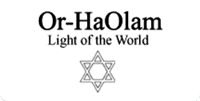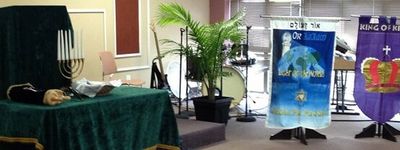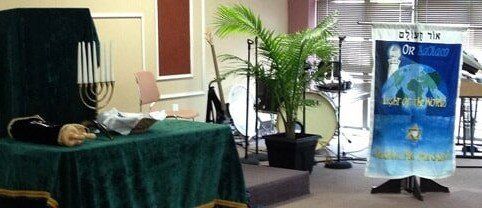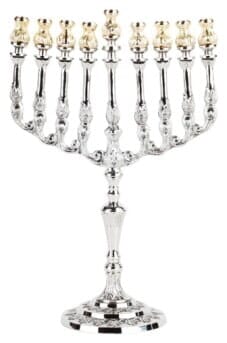MINISTRY IN GAITHERSBURG, MD
THE FEASTS
To paraphrase the first question of the Westminster Shorter Catechism - The chief ends of human beings is to Glorify God and enjoy Him forever!
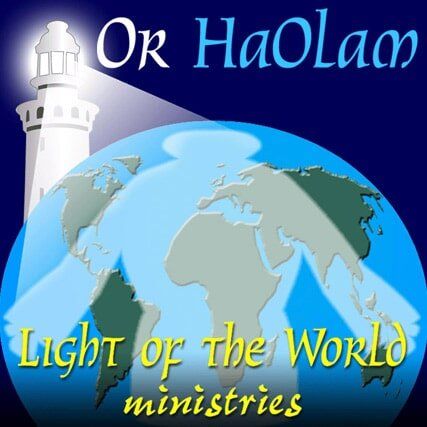
The people of God have observed calendric celebrations from time immemorial. The modern Ekklesia (called body and church) developed their calendric celebrations based on two things: (1) The Death and Resurrection of Yeshua - Jesus the Messiah. And (2) loosely based on the feasts that God called Israel to celebrate.
It is our belief that they should not have stopped being celebrated, and in fact the probable reason for cessation was reaction to social rejection and Roman persecution. Or HaOlam's vision is to restore that calendric celebration according to biblical observance inclusive of revelation of the risen Messiah. Each feast is described simplistically. If more information is desired, please contact us at 301-355-7833.
Shabbat - The Sabbath

Passover - Pesach Bikkurim - Resurrection
This is the feast celebrating Israel's exodus from bondage to slavery in Egypt by the application of lamb's blood on the doorway. It is also the celebration of the time of unleavened bread as a reminder to sinlessness.
- Time of deliverance by the blood of the lamb
- Time of Yeshua's (Jesus) last supper/crucifixion and resurrection
Jesus last supper:
In the New Testament it is the holiday period that Yeshua celebrated his last meal with his disciples, went to the cross as the Lamb of God and offered his blood as the atonement. It is also the season of the resurrection on the third day; the feast of first fruit offering is called bikkurim in Hebrew.
History:
Israel had been enslaved 400 years! The Egyptian leader - the Pharaoh did not remember Joseph! Now Moses was raised up-to be the deliverer of God's people.
One thing remained; for God to demonstrate to the pagan nation His awesome power. The 10 Plagues, culminates with the slaying of the first born of all creatures in the kingdom who had not put the blood of the lamb on their door posts!
This was a faith step by the people. For we read that not only the Israelites applied the blood, but also a "mixed" multitude. This included Egyptians and others in the land who had heard the word and obeyed by faith. Then it was, through faith, that death passed over all who had applied the blood and were obedient to God. Israel was told to take a spotless lamb of the first year. Keep it for three days and then all were to gather as the father killed the lamb and took the blood and put it on the doorposts. So too, God the Father, came in human form as the Lamb of God.
Jesus ministry:
Yeshua (Jesus) came, as the Lamb of God. Like the exodus lamb, blood needed to be shed. At that Passover Seder Yeshua, sharing that meal with his disciples, took the bread - the unleavened bread - the Matzoth - and said ". take eat, this is my body broken for you."
And likewise, after supper he took the cup and gave thanks. Then He said: "This cup is the new testament in my blood, which is shed for you. As often as you drink it, do this in remembrance of me.
Most significant event:
After that last meal, Jesus was crucified and buried. The Resurrection is the crowning effect of this feast. When Israel left Egypt, their deliverance through the Red Sea onto dry ground while watching Egypt's Army washed away in the sea, occurred on the third day! Israel began a new life in the desert. This prefigures Yeshua's crowning achievement on the third day when He rose bodily from the dead. Paul said we have no hope without the resurrection. It is indeed the most significant event in all of scripture.
Biblical verses Leviticus 23 versus 10 & 11 refer to the first fruit offering as a wave offering on the day following the Sabbath of the Passover. This works out to be the third day! Just a coincidence? I think not! In 1 Cor. 15.20, Yeshua is called the firstfruits of them who slept. The inference is clear. He is the first to be approved, the wave offering of the first grain, the new grain, the unleavened bread.

If you would like to attend our Last Supper Seder Please Contact Us For More Information
Shavuot - Pentecost
3500 years ago, 50 days after crossing the Red Sea, at Mount Sinai, God gave Israel the Torah - His instructions for long life, health and happiness as well as the idea of repentance and atonement.
- The mountains trembled - the people were in awe and the fire of God poured forth.
2000 years ago, (1,500 years after Isreal left Egypt), 50 days after the resurrection, while the disciples were worshiping and celebrating Shavuot the Ruach HaKodesh - the Holy Spirit came in fire upon them and the mountains trembled again and the people were in awe again as the fire of God came as tongues of fire and people spoke in tongues and the Church the Ecclesia (in Greek) - Kehilat (in Hebrew) was born!
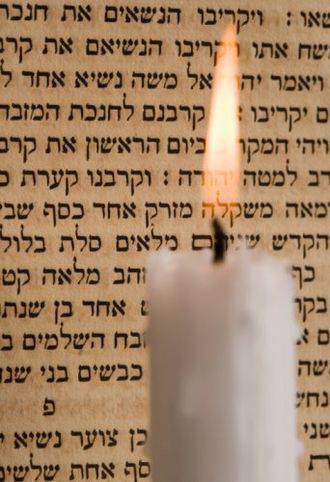
Yom T'ruah - The Day of Blowing of Trumpets (Shofarot)
A feast on the first day of the biblical 7th month when Israel was called to have a day of blowing of trumpets, and a day of remembrance. The day is a celebration of God as king and anticipates the ushering in of the kingdom of God.
- Call to hear God's direction
- Call to prepare
- A sign people
Traditionall Rosh Hashanna:
This day is traditionally called Rosh Hashanah, meaning head of the year. However, this term never appears in scriptures! In fact, in Leviticus 23 verse 24 it says to remember this day on the First (1st) day of the seventh (7th) month! Remember, the first of the year begins in the month where Passover is celebrated. In Leviticus 23.4 and Exodus 12.2 the Lord calls this the start of the year.
The sound of the trumpet:
OK, so what does it mean? Ironically, there is no other mention of what to do on this day in the scriptures. However, in Revelation there are 7 last trumpets. And in 1 Corinthians 15.52 and 1 Thessalonians 4.19 the sounding as the Lord comes back to take His Church is that of a trumpet. Also, let's not forget that the first followers of Messiah Yeshua were all Israelites, called Jews. The trumpet sound in the Hebrew Scriptures consisted of either the Shofar (Ram's horn) or the silver trumpets. Whenever, the shofar sounded it specifically meant for Israel to come prepared to listen to something God was about to share! For us today, it means to come prepared to listen to the prophetic voice of the Most High God for specific direction either for this season or for this time or both. Now, add the significance of the date! This is the first day of the 7th month. Seven (7) in scripture signifies God's number. So here we have a group of Moedim beginning on the first day of the 7th month. (For more information look at the write up on Feasts). We also call this group of celebrations the fall feasts because we celebrate one group of feasts in the spring, consisting of Passover (deliverance, death and resurrection) and Shavuot (Pentecost) representing the early harvest. But here we are in the fall season. Therefore, this season begins on the first of a month representing God's number with a trumpet blast leading into a time of celebrations representing the fall harvest. We know that harvest not only refers to crop reaping but to God's reaping times of His harvest (His people).
A sign People:
Israel was called to be a sign people. In Hebrew that word is OTE. God told them that all of their actions would reflect God's call on their lives. As new testament believers we are called to take the message of Yeshua to the world the gospel, and evangelize proclaiming the kingdom of God is at hand. The sign will be our love for Him and for one another.
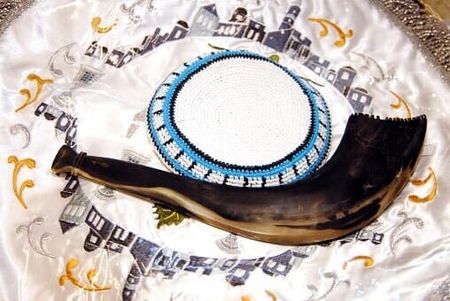
Come and join us as we prophetically act out this meeting time anticipating God's directions for us.
Yom Kippur(im) - The Day of Atonements
This was the day when the nation of Israel was atoned. It is a reminder of God's eternal love for His chosen people, Israel. It is time of preparation of Israel to intercede for the nations of the world.
The first thing one notices is the title for the day. In Hebrew the word Kippurim is plural, that is why we call it atonements. The word comes from the time God covered Adam and Eve with animal skins. The term cover is the Hebrew word Kappar. Tradition calls this Yom Kippur indicating one atonement. We prefer to use the biblical name for this day, Kippurim.
As mentioned elsewhere, these days are really appointments with God, called Moedim. Let's remember that this is not a New Year time but the feasts of the seventh (7th) month; it is God's month! This day is to be celebrated on the tenth (10th) day of the 7th month. The number 7 we know is God's number and 10 represents testimony, law and government. If we put the pieces so far together, we see that there is prophetic significance in coming together and remembering this date! So as New Testament believers, why should we celebrate this day and how should we celebrate this day.
It was on this date that Israel had a very special celebration. It consisted of the High Priest, specially appointed, specially prepared and with very detailed instructions, entering the Holy of Holies, not once, but twice and sprinkling blood on the mercy seat each time. The first entrance into the Holy of Holies was to atone for the sins of the high priest. The second time he came in, he atoned for the Nation of Israel. For more information see Leviticus chapter 16.
If we look at what transpires next, we see that Israel on the ensuing feast has special atonement provisions which we believe indicates intercession for the nations! The next feast is the feast of Sukkot to be celebrated on the 15th day of the 7th month. That is 5 days after the 10th. Five (5) is the number of Grace. So, Israel was atoned by the High Priest so that they could intercede, call for grace, for the rest of the nations of the world. Remember, you and I as new covenant believers are called priests and as such we are called to intercede for the not yet saved (the lost).
However, in Leviticus 23 we are called to a most sacred time by having to “afflict ourselves.” Tradition over the millennia has interpreted this as fasting! However, in the New Testament, we are no longer to afflict ourselves as our final atonement has been accomplished. Yet, fasting and intercessory prayer are an integral part of what we are to do.
Therefore, we celebrate this day, not in the tradition of fasting for ourselves. We encourage all to use this gathering time as an intercessory prayer time for the nations of the world today.

Sukkot (Called Feast of Tabernacles in English) is, in our opinion, the celebration with the richest traditions.
- Full Provision
- Jesus' Birth
- Eternal Promise
Rich tradition:
As noted elsewhere, the term in Leviticus 23 for these celebrations is Moedim which most closely resembles the concept of scheduled times for meeting together. God declares these MoedimHISMoedim, HIS
appointments. Therefore, they are not Jewish holidays, nor are they Christian holidays, nor are they just plain feasts! They are about purposefully coming to meet with the King of Kings and Lord of Lords!

As New Testament believers, we know that all meetings with God are truly meetings with the Messiah, Yeshua Hamashiach (Jesus Christ). So what does this celebration, meeting, have to do with Yeshua?
Israel's Journey – full provision:
This celebration is an eight (8) day celebration commemorating the remembrance of the Nation of Israel's journey through Sinai for 40 years. During that time we find the scripture tells that God totally provided for all Israel's needs! They had food, shelter, clothing and whatever was needed for that journey. The Bible says that even their shoes did not wear out. This means they had FULL PROVISION!
In Genesis Abraham learns to call God Yehovah (Yahweh) Yireh (Jireh) the eternal one is the provider. In their journey through the desert, Israel learned to recognize Him as their provider and to remember Abraham's experience with Isaac foretelling that God would be the provision also. Some 1500 years later the world learned that the provision was named He Who is Salvation – Yeshua – Jesus! He is the Lord who saves – Hosannah!
Because Israel traveled the desert in temporary dwellings called Sukkahs the name of the festival is called Sukkot. We remind ourselves of those 40 years, as God commanded in scripture, by building our individual Sukkah at our homes and spending time in that Sukkah either sleeping and eating or just eating to remind us of our reliance upon God for all our provision. We do this for 7 days as the scripture tells us.
Chanukah - The Feast of Dedication
Chanukah (also spelled chanukkah and several other ways) is the festival celebrated sometime in late November through late December. It falls on the 25th of Kislev (Chislev) of the Jewish calendar. Kislev is either the 9th month (biblical calendar) or the 3rd month (traditional calendar).
Chanukah is NOT found in the Hebrew Scriptures because the event it celebrates did not happen until 165 BCE, or almost 300 years after the last book of the Tanach (Hebrew Bible) was completed.
However, it is found in the Gospel of John in the New Testament! According to the account in John (10:22) Yeshua (Jesus) answers the question of who he is by declaring “I and the Father are one!” Yes on this festival Yeshua dedicates himself. He unequivocally declares His equality with God, His deity!
Chanukah lasts 8 days. According to Talmudic tradition it recalls the so-called miracle of the oil that lasted for 8 days when only enough was found for one day.
Chanukah recalls the victory by God through the Maccabees over the Syrophoenician controlled temple in Jerusalem. What a mighty miracle! God preserved His people and therefore the Messiah could come forth. Without the miracle, we would not have had Jesus!
The event of this victory is found in the Apocryphal books I and II Maccabees. In this account, the celebration of the 8 days is the celebration of the Festival of Booths (Sukkot) celebrated approximately two months late because the Greeks were controlling the temple. At every dedication of the Temple Sukkot was celebrated. You might say, it was at the feast of Sukkot that the Temple was dedicated. (See 2 Chron 7, Ezra 7). The word dedicated in Hebrew is the word “Chanukah.”
Spiritually, it is a wonderful time to rededicate ourselves to our walk with God, our submission to Yeshua’s guidance and permitting Him to mold us into the person we are being changed.
For more information about the history see Maccabees I and II.
Purim - Esther
We also recognize that it is at this time that we are encouraged to give gifts to one another and portions of food to the needy. This is the biblical time of gift giving.

